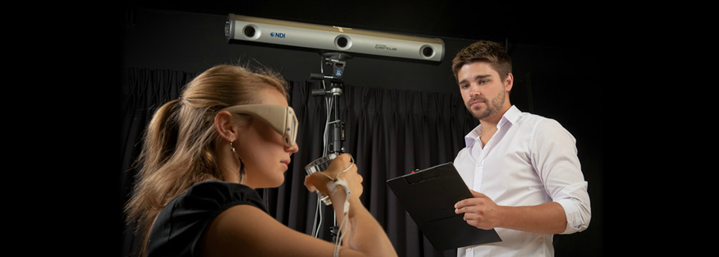Claudia Gonzalez
Canada Research Chair
Assistant Professor
Department of Kinesiology
Research

In the Brain in Action laboratory we investigate how the brain processes and integrates sensory and motor information. In particular how vision and hapsis (touch) guide our arm and hand movements for reaching and grasping.
We are also interested in understanding the complex interactions of the motor system with cognitive processes such as language, memory and spatial abilities. We use human psychophysics, behavioural measures including eye and hand kinematics and cerebral blood flow to infer brain function. Our research includes healthy and neurological populations.
Sensorimotor control for reaching and grasping

Most of us, including left-handers, would pick up a cherry from a bowl using our right hand. One possible explanation for this general right-hand preference is that the left hemisphere (which controls the right hand) processes visuomotor information more efficiently than the right hemisphere. We have a number of projects in the lab to address this possibility. Some questions we are looking answers for are:
- Are there hemispheric differences in the processing of visual information relevant to grasping? If so, what object properties are more relevant to each hemisphere?
- What are the roles of the left and right hemispheres in the integration of visual and motor information for grasping? Are these similar in the haptic/motor domain?
- What is the role of eye movements during grasping with vision and with hapsis? Do eye movements influence grasping with the right and left hand differently?
- What are the contributions of vision and hapsis to hand preference for grasping? Are these contributions similar during development and in senescence?
Motor and Cognitive Interactions
We produce hundreds if not thousands of reaching and grasping movements every day. Most of these movements occur while we are engaged (i.e. concur) with cognitive tasks that require, language, attention, memory, processing of spatial information etc. We are interested in understanding how these cognitive processes influence our hand actions. For example:
- How and under what circumstances perception influences action and viceversa?
- Are there memory traces of our hand actions? If so, what type of memory?
- Is there a relationship between hemispheric specialization for language and hemispheric specialization for grasping?
- Do visuospatial demands influence hand use and precision for grasping?
We are addressing some of these questions by studying patients with neurological conditions such as hemispatial neglect, congenital blindness, and people with language disorders. At the end of the day we hope to refine our understanding of the general principles underlying cerebral asymmetry, organization and function. This knowledge is essential if we are to develop effective and appropriate rehabilitative strategies for patients with brain damage